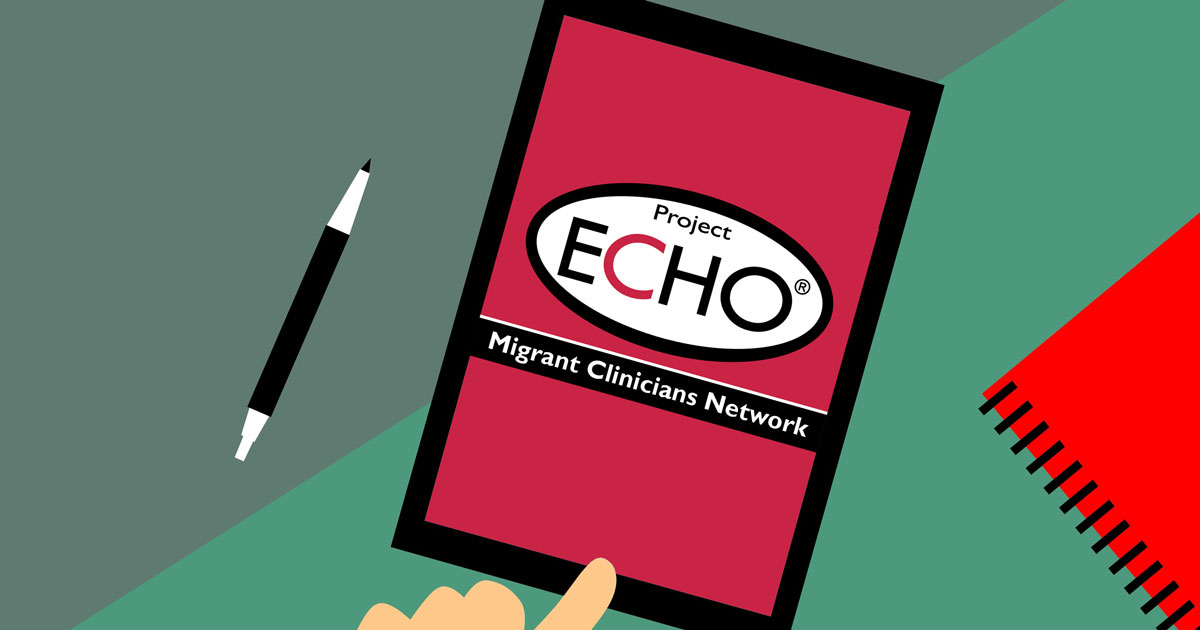- Who We Are
- Clinician Employment
- Publications
- Witness to Witness (W2W)
- El Premio Kugel & Zuroweste a la Justicia en la Salud
- Your Voice Matters: Photovoice Project
Tue, 04/03/2018 | by Martha Alvarado


MCN’s ECHO Diabetes series drew attention from health centers throughout the United States, with participation from twenty-two community health workers who represented ten health centers and programs from east to west. These included Community Health Partnership of Illinois, Hospital General Castañer in Puerto Rico, Clínica Msr. Oscar A. Romero and Clínica Comunitaria de Vista, both in Southern California, Suncoast Community Health Center and MCR Health Services in Florida, Western Wayne Family Health Centers in Michigan, Ampla Health representing Northern California, Golden Valley Health Centers in Central California, and the Kansas Statewide Farmworker Health Program (KSFHP).
Participating from KSFHP was Diana Lady, the only full-time Health Promoter at KSFHP. Her incredibly busy schedule includes endless communication with providers regarding clients, home visits, meetings with hospital and clinic managers, checking in with other health promoters, and assisting them in any way she can. Diana’s joy is being able to be the link between clients and providers so that they receive necessary services that will lead them to better health and better lives. Above all, Diana loves that she is able to empower her clients to take charge of their own lives by teaching them how to advocate for themselves, and letting them know they are valued, strong, and important. Recently, Diana took some time off from her busy schedule to talk about diabetes in her community and our Project ECHO on diabetes which finishes up this week. Here are her responses, edited for clarity and length.
Martha Alvarado: Is diabetes a problem in your community?
Diana Lady: Diabetes is a problem in my community because our clients are affected by ignorance of the symptoms, long work hours that prevent them from being able to attend [their] annual medical appointments, difficulty among family members to adapt to a new diet, barriers in language to communicate the difficulties they are going through due to lack of interpreters, and lack of motivation to meet the goals of exercise and nutrition due to the lifestyle here in the United States.
M: Can you tell me a story about one of your diabetes patients that you think really shows how diabetes affects your community?
D: We have a female client of 51 [years], diagnosed in 2009, and since her diagnosis has been seen by various clinics and doctors who have tried to help her maintain her normal glucose levels. However, these efforts have been in vain due to her lack of follow-up in treatment. Promoters and case managers have also been intervening with talks and motivational visits, and practical examples for her to move forward, and despite all these efforts, no positive progress has been seen so far. She is currently diagnosed with more than five diseases derived from diabetes. We have made efforts to visit a mental health therapist. She states that she will go to [her] appointments but she cancels at the last minute. She has the full support of her family and children. Her family has contacted us to know how they can help her, and they have been given guidelines to implement. It may work for a week, but as time goes by, everything breaks down again.
Despite all barriers, we continue helping her, talking with compassion and helping her understand that she is in control of her illness, not the doctor.
She is a part of a community in which other clients are also affected by diabetes, and what we can see is the lack of motivation to follow simple steps to benefit them.
Definitely, as health promoters, we need training to know how to talk to our clients and how to make them see the importance of following healthy advice and this ECHO series has helped me a lot for the reason that it shows me the mental component that is playing a very important role in diabetes [self-management].
M: Why did you decide to take this ECHO series?
D: A member of MCN contacted us to find out what needs we had regarding clients with diabetes. We had a series of meetings in which I could express the current frustrations and that way MCN could lead me in the training. Part of my responsibilities is to [provide] leadership and help to other health promoters in the state of Kansas.
M: What’s your favorite part of the ECHO series?
D: The parts that most motivated me were when we discussed the impact on mental health in diabetes, what to do when there is a natural disaster, and the socio-economic factors of diabetes.
M: What did you learn or encounter that you weren’t expecting?
D: What I found is an extensive Hispanic community that is working continuously and hard to support efforts that benefit the diabetic community. I really did not know the university programs and the multiple resources that there are in the network that can support us with videos and visual tools for our visits and focus groups.
M: What’s one thing you hope to incorporate in your work that you have learned from the series so far?
D: What I want to incorporate is the awareness between mental health and diabetes. In fact, I have already begun sharing it in the monthly meetings we have with all the other promoters.
We’d like to thank Diana Lady and the KSFHP for participating in the series and the invaluable comments she had to offer. We look forward to working with them both in the future. If you’d like more information about the KSFHP click here.
Like what you see? Amplify our collective voice with a contribution.
Got some good news to share? Contact us on our social media pages above.
Return to the main blog page or sign up for blog updates here.







